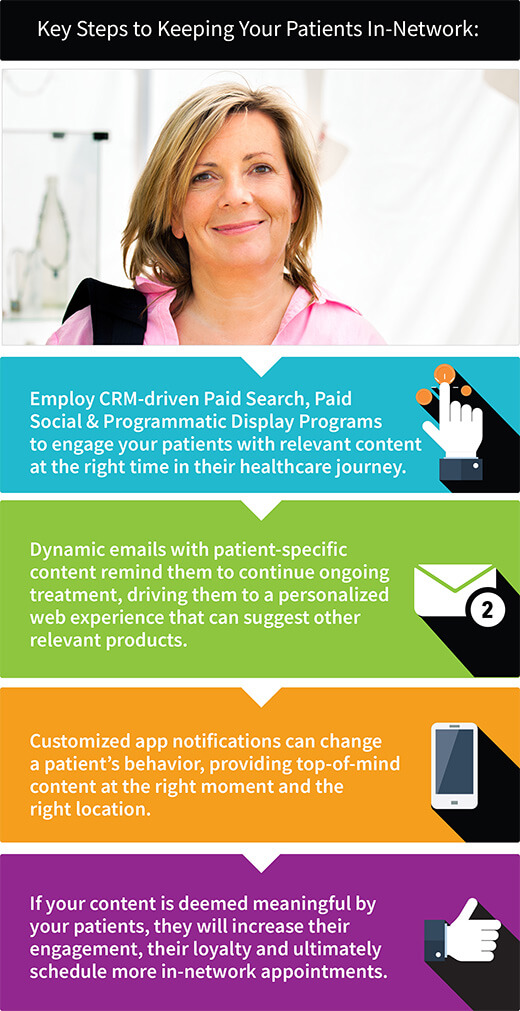We all know it’s cheaper to market to your existing customers than it is to acquire net-new customers. Yet, when we have a service-line goal to hit, we fall back to old hat prospecting strategies. And while prospecting strategies need to be included, we should be deepening our understanding of our existing patients, their relationship to other service lines, recognizing and leveraging data that will indicate which patients are candidates for which services. Better still, we should have strategies that continually nurture existing patients across all service lines, keeping them “in the system” for all their healthcare needs – today and into the future.
Studies have shown that personalized marketing will increase marketing ROI 15-20% or more.
In short, we need to take our marketing methodologies from a siloed model to a connected approach to achieve this.
I’m guessing some of you can relate:
 You have a patient that has just completed bariatric surgery. They are booked for a follow-up appointment, given some generic post-care printouts and sent home. About six weeks post-op, they start to experience depression. So they search online for a behavioral health specialist. They may also ask friends and family for referrals. They then decide on a doctor, a doctor that is not in your system. About six months post-op they’re ready to commit to an exercise regime, so again they get search online for group class programs near them. Again they ask friends and family for referrals. They then find a local health club offering a free one-week trial and wind up joining that health club – a club that competes directly against a fitness product you already have.
You have a patient that has just completed bariatric surgery. They are booked for a follow-up appointment, given some generic post-care printouts and sent home. About six weeks post-op, they start to experience depression. So they search online for a behavioral health specialist. They may also ask friends and family for referrals. They then decide on a doctor, a doctor that is not in your system. About six months post-op they’re ready to commit to an exercise regime, so again they get search online for group class programs near them. Again they ask friends and family for referrals. They then find a local health club offering a free one-week trial and wind up joining that health club – a club that competes directly against a fitness product you already have.
In the above example, we missed out on our patient’s behavioral health and fitness needs resulting in a loss of revenue while simultaneously making our patient do all the legwork of figuring out their health solutions on their own. We let the patient journey end with a follow-up appointment and a printout. We could have employed key data – key data that your competitors do not have access to – to deliver a helpful and proactive experience.
CRM driven PPC and social campaigns, personalized email content driving to a personalized web experience and tailored app notifications could have changed our patient’s experience, eased the burden of their search for solutions, increased their loyalty to our healthcare system and driven more system appointments. With this holistic approach, we anticipate and follow our patient’s journey beyond the originating action (the bariatric procedure).
The time for change is now.
We, as healthcare marketers, have to think beyond simply meeting service-line goals and relying on prospecting efforts as the only path towards achieving said goals. We, as an industry, need to start thinking through system-wide goals and the entire patient healthcare journey. Personalized marketing programs must be created to support the full patient experience, to increase appointment bookings and keep them in the system.


